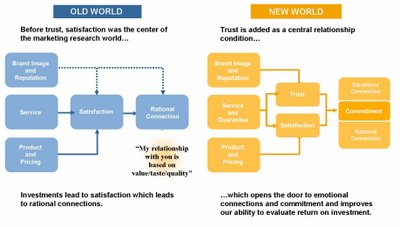Guess what? These days it’s not enough to ensure customer satisfaction – if you want loyal customers (read: higher profit margins), you’ve also got to make sure you appeal to their rational and emotional levels.
At least that was the message of a breakfast briefing organised by market research firms Harris Interactive and Market Share.
According to a study they did, customer loyalty can be nurtured through building trust together with satisfaction – in a nutshell, if companies can get customers to trust them and believe that the product they’re paying for is value for money, this creates an emotional connection between customers and brands, thereby increasing the level of commitment. This trust-based commitment then has the potential to translate into monetary returns for companies, as these consumers are more price-insensitive. This means even if you raise prices, they’ll still buy your product(s).
(Ok, I know you can't really see the above diagram but that's the best I've got.) There’s a lot more to the study but this is the fundamental point. I could be wrong but at the briefing, it seemed as though the hosts were delivering their new findings to a slightly skeptical crowd and it was easy to see why as the concept of customer satisfaction has been central to the marketing research community for a long time. During the Q&A session for instance, one participant questioned the disconnect between trust and satisfaction, while another raised the issue of the risk of basing a business model on trust, because once broken, is something that is very hard to repair.
The briefing facilitators though handled the queries well – with the first question it was explained that there’s no disconnect at all as trust was merged together with the old customer satisfaction model; all the study did was to uncover the element and stretch the pic. As for the risk of trust, it might be a case of consumers being more willing to forgive secondary mistakes, and allowing the brand a second chance at redeeming itself.
As a marketer, what do you think? Does trust have a place in your strategy?
2 comments:
same old same old
When I was a child, I think the reason 'Lian Hup' was OUR default provision shop and not 'Ah Tai', was because we trusted Lian Hup. And vice-versa. We could just take whatever we wanted from the shop and tab it to our family account. Shock me! But I fail to see the 'new' insights offered at your breakfast briefing. But then again, I may be daft.
Trust to be termed as the new world?
That is ridiculous.
Trust had always been the key.
(be it trading, buying, selling, marketing)
imho, an insight would be on the "how"s and "what"s.
which type of execution would be the most effective in a given market and target audience?
how do marketers quantify trust and satisfaction?
we all know that market research on satisfaction has caused more call centres to be automated.
we all know as well, of the frustration we would run into when we have to call a help line.
What is the problem here?
Post a Comment